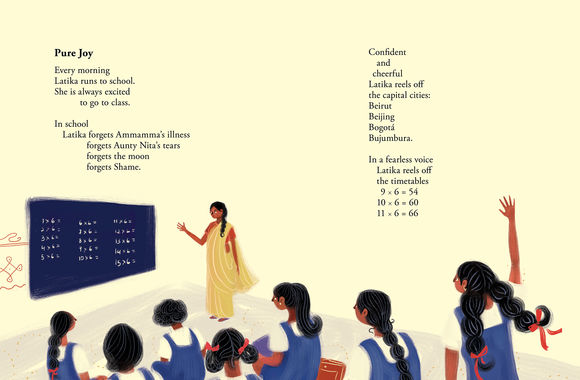Andrée Poulin Tackles Period Stigma in Her Beautiful New Verse Novel for Young Readers
Andrée Poulin's Burying the Moon (Groundwood Books, illustrated by Sonali Zohra) tells the story of a young Indian girl whose courage changes the lives of all the girls and women in her village.
In Latika's rural village, there are no toilets, which means the women have to wait until night falls, when they can retreat to a field to relieve themselves. Not only are there hazards like scorpions and snakes, but the lack of sanitation can often lead to illness. And once a girl begins menstruating, the lack of toilets means she is forced to leave school, creating a cycle of where women's options are severely limited.
The taboo not to speak about any of this is powerful, but Latika sees an opportunity to change her fortune that of the whole village. A government representative is coming to visit, and if Latika can overcome the shame that's been ingrained in her to advocate for the construction of public toilets, she could change the course of her whole life.
The beauty of Sonali's Zohra's artwork makes this story of bravery a joy to read, and with period stigma still adversely effecting millions of girls and women worldwide, Burying the Moon is an essential read and a great way to discuss often-ignored questions of sanitation, menstruation, and equity with young readers.
We're thrilled to welcome Andrée, who previously worked in international development, to Open Book to discuss Burying the Moon. She tells us about why toilets became an impassioned subject for her, the book's evolution from picture book to middle grade verse novel, and her favourite part of the writing process.
Open Book:
Tell us about your new book and how it came to be.
Andrée Poulin:
Before becoming an author, I worked in international development, for a Canadian NGO that funded projects in India. I was lucky enough to go to India a number of times. It’s there that I learned that millions of people in India didn’t have access to a toilet. I thought it was an important issue and that one day I would like to write about it. That’s how I got the idea for Burying the Moon.
OB:
Is there a message you hope kids might take away from reading your book?
AP:
Be interested in other kids. Be curious about how people live in other parts of the world. Be grateful. Don’t take things for granted. Like toilets.
OB:
Did the book look the same in the end as your originally envisioned it when you started working, or did it change through the writing process?
Your CanLit News
Subscribe to Open Book’s newsletter to get local book events, literary content, writing tips, and more in your inbox
AP:
The first version of Burying the Moon was written as a picture book. It was 900 words long. The manuscript was refused by a publisher who very kindly wrote and said: ‘Your story is interesting but it’s too complex for a picture book.’ So, I decided to lengthen my story to make it a middle grade novel. At the time, I was reading free verse novels, mostly from British writers and I was captivated by this genre that was new to me. I thought, why not use poetry to tell my toilet story? I tried it and I loved it! And it became my very first free verse novel.
OB:
What do you need in order to write – in terms of space, food, rituals, writing instruments?
AP:
I don’t need much. A computer, a quiet room. The most important thing I need in order to write – and it’s a challenge for me – is concentration. To do meaningful writing, I need to unplug from social media.
OB:
What's your favourite part of the life cycle of a book? The inspiration, writing the first draft, revision, the editorial relationship, promotion and discussing the book, or something else altogether? What's the toughest part?
AP:
For me, the toughest part is plotting. I’m a poor plotter. But the revisions are the fun part. I love the tweaking and the fine-tuning, maybe because I know it means the book is almost finished!
OB:
What are you working on now?
AP:
A middle-grade novel about the wild horses of Sable Island, Nova Scotia.
_______________________________________________
If she could, Andrée Poulin would read from morning to night. Her love of reading is what brought her to writing. After working as a journalist for many years, she went into international development.
Her picture books and novels, for children of various age: from 4 to 14 years, have won a few prizes and awards. Her stories deal with friendship, empathy, tolerance, poverty, and solidarity. Poulin believes books can change the world. By setting her stories in Canada, Africa, and Asia, she takes her readers on adventures in discovering other cultures.
Poulin loves to share her passion for reading and her pleasure for writing with children. She gives workshops for youth in schools and libraries.





